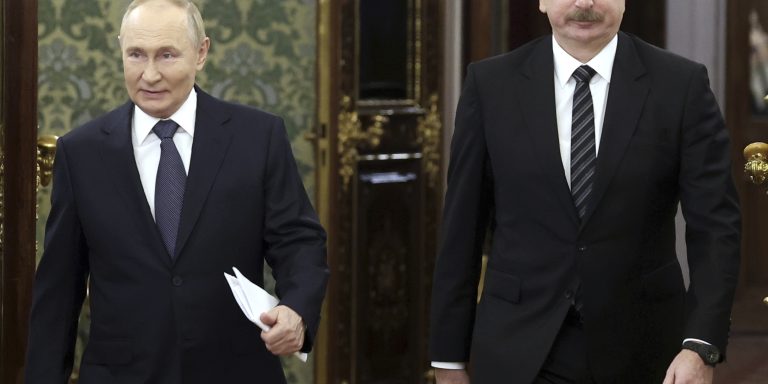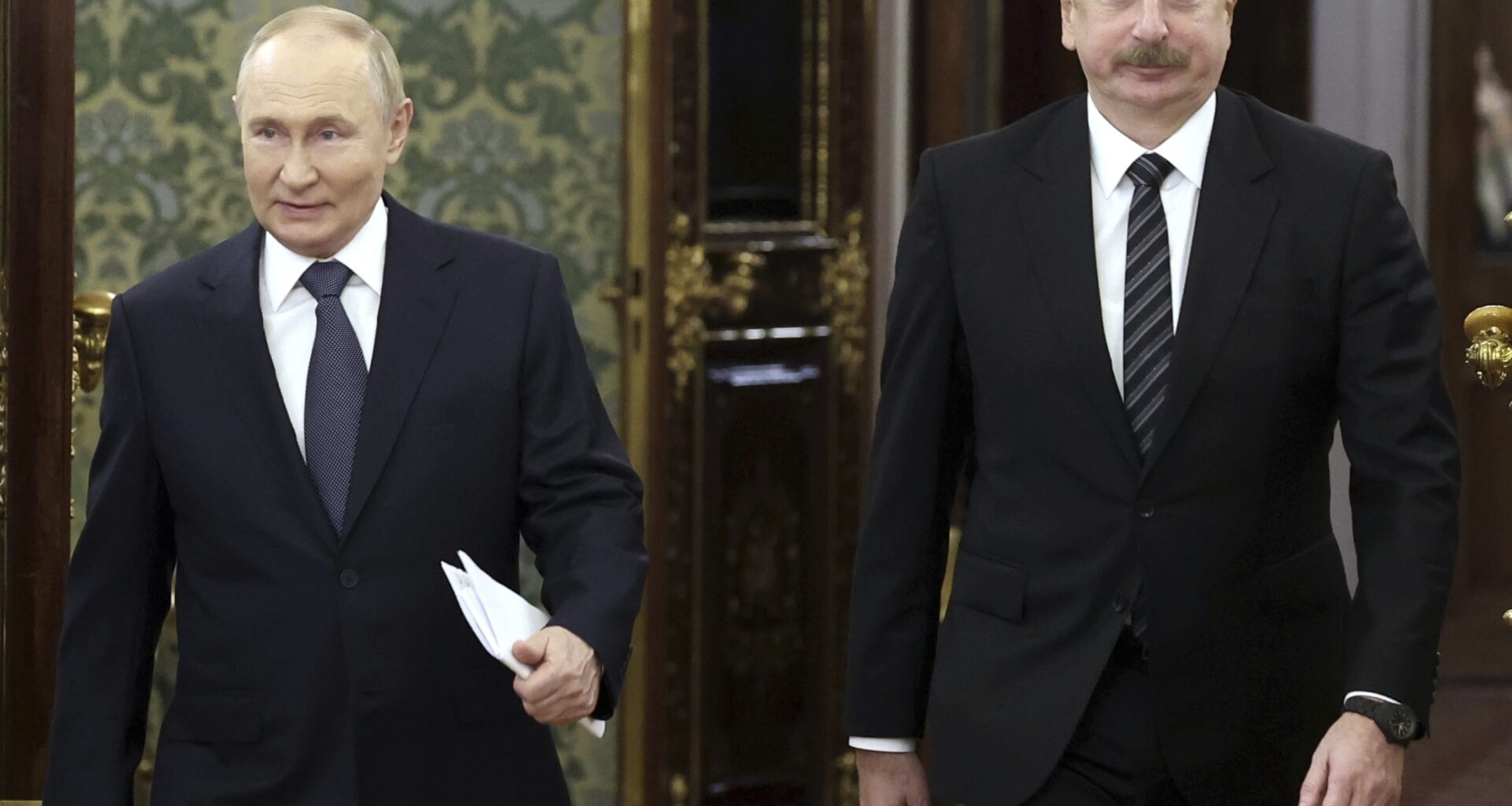
Valery Sharifulin, Sputnik, Kremlin Pool Photo via AP, File
Bottom Line Up-Front
In a significant shift in the South Caucasus region, tensions between Azerbaijan and Russia have escalated sharply — marked by tit-for-tat public arrests in both countries — following the deaths of two ethnic Azeri brothers while in Russian custody.
By escalating this dispute, Azerbaijani President Ilham Aliyev has signaled Baku’s growing confidence and strategic relevance on the global stage while positioning himself as a leader willing to challenge Moscow.
This year marked a milestone, as Baku and Yerevan finalized the text of a new peace agreement, and Armenian Prime Minister Nikol Pashinyan became the first Armenian head of government to make an official diplomatic visit to Türkiye in the post-Soviet era.
Türkiye is emerging as the dominant external actor in the South Caucasus, as evidenced by its leadership in peace talks between Azerbaijan and Armenia — effectively supplanting Russia in a role it once firmly held.
In a significant power shift in the South Caucasus, tensions between Azerbaijan and Russia have escalated sharply this month following the deaths of two ethnic Azeri brothers, Ziyaddin and Huseyn Safarov, while in Russian custody. In late June, Russian law enforcement in Yekaterinburg — a Russian city located in the Ural Mountains — detained 50 individuals as part of a decades-old contract killing investigation. Among those detained were the Safarov brothers. After their bodies were transferred to Baku for autopsy, it was revealed that they had been tortured to death, allegedly by Russian authorities, sparking outrage across Azerbaijan. In response, Azerbaijan’s Prosecutor General’s Office officially opened a criminal case against the Russian law enforcement officers involved in the Yekaterinburg raid. Baku also cancelled a planned visit by Russian Deputy Prime Minister Aleksei Overchuk, as well as cancelling all Russian-linked events, citing alleged ethnic bias by Russian authorities during the raids.
What followed was a tit-for-tat escalation, primarily through publicly documented arrests. On June 30, Azerbaijani authorities retaliated by raiding the Baku offices of the Russian state media outlet Sputnik and arresting two of its employees. Azerbaijani police also detained several Russian IT specialists — one reportedly a tourist — and released videos showing some of the detainees subjected to a humiliating “perp walk,” while others appeared bloodied and bruised.
On July 3, Russian security forces in Yekaterinburg detained Shahin Shikhlinski, head of the “Azerbaijan-Ural” diaspora organization, a prominent Azerbaijani diaspora group in the region that maintains close ties with Azerbaijani state officials. Officers reportedly smashed his car window to carry out the arrest. Shikhlinski, who had previously been briefly detained on June 27, was taken to the Investigative Committee for questioning as a witness. That same day, anonymous Telegram channels published footage allegedly showing the violent interrogation of another ethnic Azeri in Yekaterinburg by FSB officers.
Relations between Azerbaijan and Russia were historically tense following the collapse of the Soviet Union, largely due to Moscow’s support for Armenia in territorial disputes — particularly over the contested region of Nagorno-Karabakh. However, ties had improved in recent years as Armenia shifted closer to the West prompting Russia to increasingly echo Azerbaijani positions during key moments in the conflict. This shift was especially evident during the 2020 ceasefire negotiations in the Second Karabakh War, and again in 2023 when Azerbaijan declared full control over Nagorno-Karabakh and Russia refrained from assisting Armenia.
Nevertheless, despite ideological similarities between Russian President Vladimir Putin and Azerbaijani President Ilham Aliyev, tensions reignited in December 2024 when Russian air defense forces accidentally shot down an Azerbaijani Airlines flight over Chechnya, killing 38 people. At the time, Moscow claimed it was responding to a potential Ukrainian drone threat. In July, as relations continued to sour, Azerbaijani state-backed outlet Minval published an audio recording allegedly implicating the Russian military in the missile strike. The outlet claimed it received an anonymous letter containing witness statements, audio clips, and technical details pointing to communication failures as a contributing factor.
On July 5, Ukraine’s Main Intelligence Directorate (HUR) reported that Russia had accelerated troop deployments at its military base in Gyumri, Armenia, despite deteriorating bilateral ties following Armenia’s withdrawal from the Russian-led Collective Security Treaty Organization (CSTO) in February 2024. A HUR representative said the buildup was part of a broader Kremlin strategy to destabilize the region.
While Russia’s military drills in Armenia are intended to project strength toward Azerbaijan, the broader diplomatic conflict with Baku highlights Moscow’s waning influence in the South Caucasus. The triggering events in Yekaterinburg were likely the result of regional dynamics rather than Kremlin orders. Although local Russian prosecutors may have acted with ethnic bias — a longstanding issue that Baku has previously tolerated — President Aliyev likely seized this particular incident to assert Azerbaijan’s rising regional power. By seemingly escalating this dispute, Aliyev has signaled Azerbaijan’s growing confidence and strategic relevance on the global stage while positioning himself as a leader willing to challenge Moscow.
This comes at a time when Russia is weakened domestically — due to its ongoing war in Ukraine — and internationally — with the loss of a key ally in Syria and its limited influence in the latest clashes between Iran and Israel. Moscow needs Baku now more than ever, as it seeks access to southern markets and transit corridors linking Russia to Türkiye, Iran, and the Persian Gulf. Meanwhile, Russia’s growing ties to Georgia have likely raised concerns in both Baku and Ankara. Georgia’s strategic location between the Black Sea and the Caucasus makes it a vital transit hub for energy and trade that bypasses both Russia and Iran. Azerbaijan relies on Georgia as a key route for its oil and gas exports, while Türkiye benefits from Georgia’s role in facilitating trade and connectivity with the wider Caucasus, Central Asia, and China.
On the other hand, as Armenia — formerly Russia’s strongest ally in the Caucasus — begins to forge its own bilateral and trilateral relations with Azerbaijan and Türkiye, Moscow’s traditional role as regional mediator has significantly diminished. This year marked a landmark development as Baku and Yerevan agreed on and completed the text of a new peace agreement. While it remains uncertain whether the two sides will formally sign the deal, the agreement signals a new phase in their relationship. Additionally, this summer, Armenian Prime Minister Nikol Pashinyan made history by becoming the first Armenian head of government to make an official diplomatic visit to Türkiye in the post-Soviet era.
Following the meeting, Turkish President Recep Tayyip Erdo?an remarked that Pashinyan appeared more open to dialogue regarding the contentious Zangezur corridor — an infrastructure project that would connect Azerbaijan with its exclave Nakhchivan and potentially unlock new energy and trade routes across the region. The fact that these developments have occurred largely without Kremlin involvement is striking. Historically, Russia has leveraged the Armenia-Azerbaijan conflict to maintain its influence in the South Caucasus, often positioning itself as a mediator and even facilitating the management of contentious border areas.
These recent developments, as well as Azerbaijan’s bold and unprecedented conflict with Russia, mark a significant shift in the regional balance of power away from Moscow and toward Ankara. Türkiye is increasingly emerging as the dominant external actor in the South Caucasus, a role once firmly held by Russia. Its growing influence is particularly evident in its leadership of peace talks and negotiations over the Zangezur corridor, effectively supplanting Moscow in a space it historically controlled. While Russia’s diminishing role is unlikely to go unnoticed, these recent setbacks underscore its declining ability to shape outcomes in the region. Türkiye, meanwhile, appears increasingly ready to step into the vacuum.
